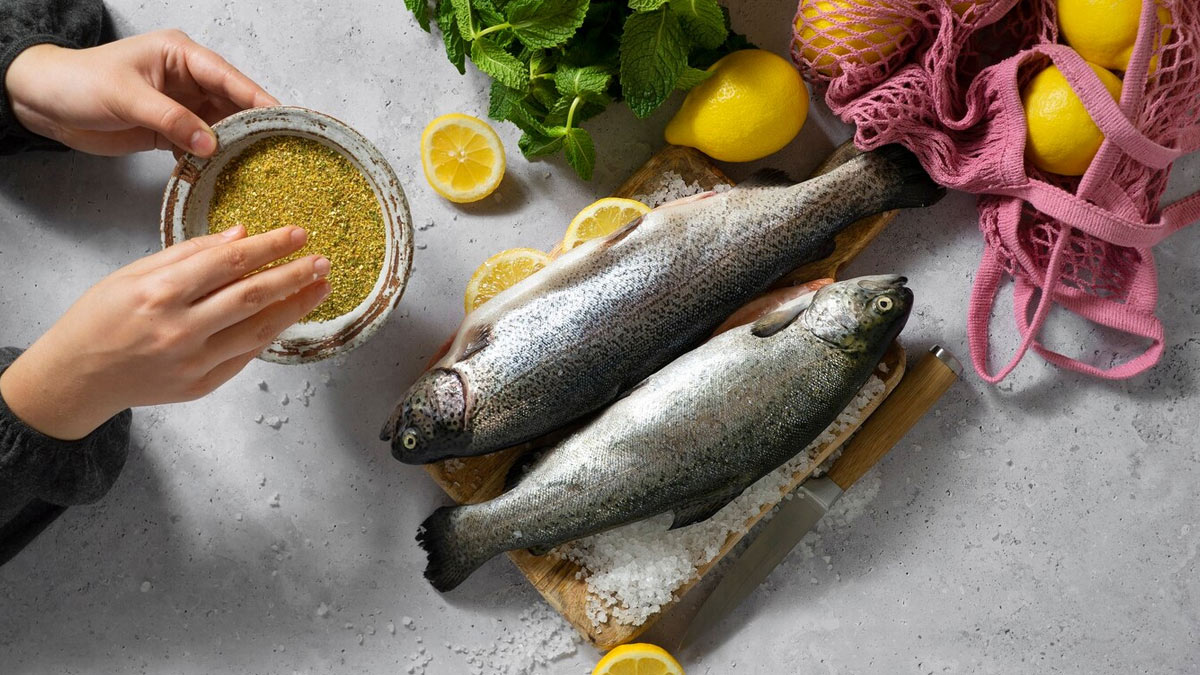
When it comes to promoting heart health, a diet rich in fruits, vegetables, whole grains, lean proteins, and healthy fats is often recommended. Most people are also advised to limit saturated and trans fats, sodium, and added sugars.
Table of Content:-
For those following a pescatarian diet, which is largely plant-based but includes fish and seafood, these principles still apply. But what does heart-healthy eating look like within the framework of a pescatarian lifestyle? We asked an expert to shed light.
Also Read: Why Harry Styles Chooses a Pescatarian Diet: Exploring The Benefits Of Nutrition And Sustainability
What Is A Pescatarian Diet?

If you know what a vegetarian diet is, then pescatarian is quite similar to it, with the only difference being that it includes fish and seafood. This means anyone following a pescatarian diet can indulge in plant-based foods, and for protein, they can rely on seafood and fish. This type of diet therefore excludes red meat and poultry.
Heart-Health Benefits Of A Pescatarian Diet

In an interaction with the OnlyMyHealth team, Dr Dhirendra Singhania, Principal Consultant-Interventional Cardiology, Yashoda Super Speciality Hospitals, Kaushambi, said, "A pescatarian diet, which includes fish and seafood but excludes other meats, offers several proven benefits for heart health. Full of omega-3 fatty acids, particularly from fatty fish like salmon and mackerel, it helps lower blood pressure, decrease triglycerides, and lessen the risk of heart attacks and arrhythmias."
According to the doctor, this diet also includes plant-based foods like fruits, vegetables, whole grains, and legumes which are high in fibre and antioxidants that keep cholesterol in balance and reduce inflammation.
A UK study of over four lakh adults found that people who ate fish instead of meat had a lower risk of heart disease, including heart attacks and strokes. According to the study published in the European Heart Journal, vegetarians also saw some benefit, but those who ate both fish and poultry did not.
The reason behind it could be the fact that pescatarians consume reduced saturated fat compared to meat eaters, which reduces Low Density Lipoprotein (LDL) or ‘bad’ cholesterol. “Research suggests they have improved blood lipid profiles and fewer cardiovascular conditions, including Ischaemic Heart Disease (IHD) and metabolic syndrome. By pairing nutrient-rich seafood with heart-friendly plant foods, a pescatarian diet is highly effective in guarding long-term cardiovascular health,” Dr Singhania highlighted.
Best Seafood For Heart Health
For optimal heart health, emphasise fatty cold-water fish with high levels of omega-3s (EPA and DHA), which help suppress inflammation, enhance cholesterol levels, and decrease the risk of heart disease.
The most favourable choices are wild salmon, sardines, and mackerel, all of which are also rich in nutrients such as vitamins D and B12. Trout, herring, and anchovies provide similar benefits with low mercury levels.
Albacore tuna is a good choice, but it needs to be consumed in moderation because of mercury levels. Oysters and mussels yield moderate omega-3s, along with zinc, iron, and B12. Eating a variety of these ensures maximum heart protection.
Risks Associated With Pescatarian Diet

Nothing is free of risks. While a pescatarian diet has many health advantages, there are certain disadvantages to note. "One is mercury exposure by certain fish like swordfish, king mackerel, and bigeye tuna, which can damage the nervous system in the long term," warned Dr Singhania.
According to him, choosing low-mercury fish like salmon, sardines, and trout and following FDA recommendations, especially for pregnant women and children, can reduce this risk. Another drawback is the potential heavy reliance on seafood, which may lead to excessive sodium intake from processed fish and disturbance of nutrients if plant-based foods are limited.
Also Read: Tuna Vs Salmon: Expert Insights On Which Is Healthier For You
The doctor also noted that environmental sustainability, such as overfishing and excessively high consumption, can have negative effects on sea life, making it important to choose eco-certified seafood.
Moreover, a poorly planned pescatarian diet may lack certain nutrients like iron, B12, calcium, and vitamin D. These can be solved by including a range of plant foods, fortified foods, and supplements as needed.
Conclusion
A pescatarian diet is said to be good for your heart. However, choosing the right type of seafood and ensuring that you don’t overconsume is crucial. If you have pre-existing conditions, it is best to consult a doctor before you start following the diet. Moreover, ensure that you maintain a balanced diet that contains a mix of fruits, vegetables, protein, and healthy fats.
Also watch this video
How we keep this article up to date:
We work with experts and keep a close eye on the latest in health and wellness. Whenever there is a new research or helpful information, we update our articles with accurate and useful advice.
Current Version